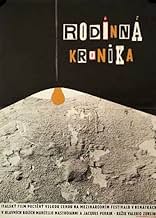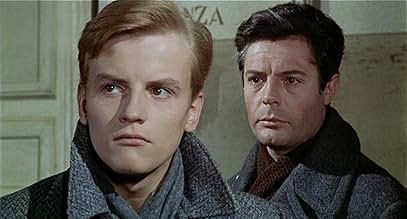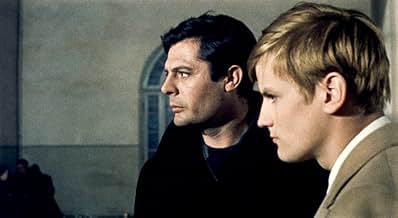AVALIAÇÃO DA IMDb
7,2/10
1,3 mil
SUA AVALIAÇÃO
Adicionar um enredo no seu idiomaA man recalls the life of his late younger brother.A man recalls the life of his late younger brother.A man recalls the life of his late younger brother.
- Direção
- Roteiristas
- Artistas
- Prêmios
- 5 vitórias e 3 indicações no total
Angelo Casadei
- Un visitatore all'ospedale
- (não creditado)
Avaliações em destaque
Two brothers ;one of them,after his mother's death (she died during the birth)is taken in by a rich man,the other has to manage .But things will not turn out as expected.
The movie is a long flashback ,Enrico's somber meditation on his young brother's fate ,whom he only saw sporadically.There are a lot of holes in the plot,probably the weakest link of an unusual film.Mastroianni and Perrin (hardly 21) give strong performances which allow the movie to avoid pathos and melodrama.They are given strong support by madame Sylvie,as their grand-mother.What will strike you in Zurlini's film is the total absence of happiness,in the world which has forgot what it is to be happy:even the scene at the restaurant where the two boys invite their grandma is downright depressing;later the money the old lady gives to her grandson leaves a bitter taste in the mouth.All the scenes in the hospital are harsh,and may repel some.
It was the second time Zurlini and Perrin had teamed up,after "la ragazza con la valiglia".The last time ,in 1976,was the making of their masterpiece (Zurlini:director;Perrin:producer and actor) " Il deserto dei Tartari" from Buzatti's eponymous novel.
"Cronica familiare" is a movie that deserves to be watched,unless you're down in the dumps.
The movie is a long flashback ,Enrico's somber meditation on his young brother's fate ,whom he only saw sporadically.There are a lot of holes in the plot,probably the weakest link of an unusual film.Mastroianni and Perrin (hardly 21) give strong performances which allow the movie to avoid pathos and melodrama.They are given strong support by madame Sylvie,as their grand-mother.What will strike you in Zurlini's film is the total absence of happiness,in the world which has forgot what it is to be happy:even the scene at the restaurant where the two boys invite their grandma is downright depressing;later the money the old lady gives to her grandson leaves a bitter taste in the mouth.All the scenes in the hospital are harsh,and may repel some.
It was the second time Zurlini and Perrin had teamed up,after "la ragazza con la valiglia".The last time ,in 1976,was the making of their masterpiece (Zurlini:director;Perrin:producer and actor) " Il deserto dei Tartari" from Buzatti's eponymous novel.
"Cronica familiare" is a movie that deserves to be watched,unless you're down in the dumps.
10Aw-komon
Phew! What a beautiful film! I'd rank this as one of the most awe-inspiringly composed and photographed color films of all time. You've never seen Mastroianni, until you've seen him in this film, walking around like an iconic black ghost in the darkly hued existentialist-to-the-nth-degree technicolor universe of post-war Italy created by Zurlini and legendary DP Giussepe Rottuno. What a stroke of genius to contrast the bleakest and most depressing of subjects possible with the most fantastically poetic and gorgeous technicolor cinematography this side of `Black Narcissus.' This is one of Rottuno's finest works ever: full of absolutely breathtaking deeper than deep blacks and colors that seem to have sprouted from some otherworldly weathered, neo-realist hallucination. And what timeless subtly paced, unerringly poetic, intelligent and completely uncompromising direction by Zurlini, the forgotten genius of Italian cinema, whose style in this film can be roughly described as a unique melange of neo-realism, Antonioni, Michael Powell, Jacques Becker, early Pasolini and early Bertolucci. It's easy to imagine how easily this story of a tubercular writer grieving the death of his younger brother through a series of flashbacks could've turned into not much more than a melodramatic tearjerker; yet in Zurlini's hands and through the incredible, tour-de-force performance of Marcello Mastroiani in the lead role, the Marxist-proleteriat-plight-of-the-poor sentimentality at the film's core transcends itself and becomes a deeply affecting, painful and ultimately cathartic meditation on death, despair, and the possibilities of redemption in the direst of circumstances.
I watched this on TCM and there was something wrong. when Enrico thinks about his brother in voice over, (as if he is writing an autobiography,) instead of Marcello's voice, some idiot dubbed in a ridiculous American actor's voice. firstly, the dubbed voice is all wrong in tone...it's as if the actor were from Car54 or Dragnet, and secondly, the voice reads the lines in the third person, often with bad translation!!!
So you have Enrico remembering his brother, and relating his recollections to the audience in the first person, but you have a voice over going "Enrico says", and "Enrico thinks",...it's a travesty.
This film is somewhat too sentimental, and slightly overwrought, but it has touching and truthful scenes as well. too bad that just when you become involved, some American butchery intrudes. 6/10.
So you have Enrico remembering his brother, and relating his recollections to the audience in the first person, but you have a voice over going "Enrico says", and "Enrico thinks",...it's a travesty.
This film is somewhat too sentimental, and slightly overwrought, but it has touching and truthful scenes as well. too bad that just when you become involved, some American butchery intrudes. 6/10.
I wept like I hadn't wept in a movie for years. Director Valerio Zurlini and his cinematographer Giuseppe Rotunno gives us a visual symphony in browns and dark yellows. The faces of the brothers Enrico and Lorenzo played with shattering truth by Marcello Mastroianni and Jaques Perrin have made a home in my brain. Their reunion with their grandmother, played by the sublime Sylvie, is an image, a film moment that I shall never forget. As it happens more often than not, the Italians have released this gem in DVD without English subtitles - not in English or any other language for that matter. I'm grateful for speaking and understanding Italian well enough to enjoy this movie to the fullest. If you do as well, I recommend it wholeheartedly.
How this one slipped off the radar screen is beyond understanding. Against a very muted palette of tone on tone, in which the character Lorenzo's beige over-coat becomes a metaphor of his indefinite link with the beige walled world, director Zurlini weaves a fascinating story of two brothers separated at birth, who effect a tragic reunion in war torn Italy.
Marcello Mastiroianni here offers a performance of greater depth than "La Dolce Vita" (which is just as it should be)but it is youngster Jacques Perrin's "Lorenzo" which surprises.
His performance, (indeed the whole film) is a study in the power of the reticence, understatement and the unsaid. Mr. Perrin's eyes, particularly in the hospital sequences, speak those volumes and light those vistas that would be trivialized in dialog form.
An excellent film with a core of deep sadness, that avoids the fatal commercial trap of sentimentalism.
Marcello Mastiroianni here offers a performance of greater depth than "La Dolce Vita" (which is just as it should be)but it is youngster Jacques Perrin's "Lorenzo" which surprises.
His performance, (indeed the whole film) is a study in the power of the reticence, understatement and the unsaid. Mr. Perrin's eyes, particularly in the hospital sequences, speak those volumes and light those vistas that would be trivialized in dialog form.
An excellent film with a core of deep sadness, that avoids the fatal commercial trap of sentimentalism.
Você sabia?
- CuriosidadesJacques Perrin had already played a boy named Lorenzo in the previous movie by Valerio Zurlini, "Girl with a Suitcase"
- Erros de gravaçãoIn the later sequence in the hospital, there are hairs on the film in several scenes.
- ConexõesReferenced in Close-Up: Why do We Need the Venice Film Festival? (2024)
Principais escolhas
Faça login para avaliar e ver a lista de recomendações personalizadas
Detalhes
- Tempo de duração1 hora 53 minutos
- Mixagem de som
- Proporção
- 1.85 : 1
Contribua para esta página
Sugerir uma alteração ou adicionar conteúdo ausente

Principal brecha
By what name was Dois Destinos (1962) officially released in Canada in English?
Responda























